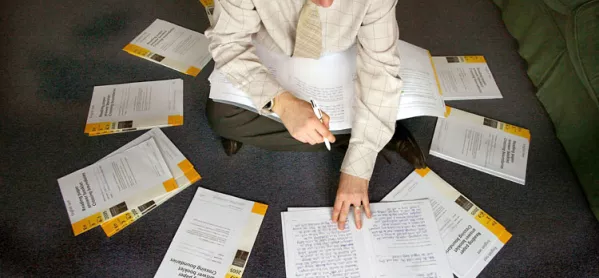What if we got it all wrong and Ofsted wasn’t causing the teacher workload problem after all? What if the real problem was to be found within the school gates?
Every weekend my partner and I, both committed school teachers, do the obligatory extra hours at the teaching grindstone. We each have our fair share of lesson planning to do. Of course, lots of marking can often cast a shadow over our entire Sunday. And yet, over the past 18 months, while I have had it tough, my partner has been pushed to the brink by his school, to the point where he is considering leaving teaching altogether.
He works at a seemingly successful school, part of a thriving multi-academy trust (MAT) no less (one of those MATs that gets heralded for its results by politicians). Despite all its protestations about supporting teacher wellbeing and easing their workload, the truth behind the closed doors of my partner’s school reveals a different story.
The workload demanded by his managers is quite simply punishing and he has to follow a marking policy that is relentless. Regardless of what he is teaching or what students have done in lesson time, he has to mark every book of every student every five hours of teaching time.
It has become a standing joke that he has to have a rainbow of coloured pens with him wherever we go to do all of this marking. Colourful stationery has never been so soul-sapping.
Not only that but, in the wisdom of his senior management team, every teacher is graded on their “quality of marking” in regular work scrutinies - using Ofsted grading, of course. You’d think that you couldn’t make it up, except only they have - in a 10-page policy rammed full of silly jargon and spurious claims.
Last week, after another Sunday interrupted, my partner was chastised for not properly marking the books of one of his Year 8 groups. This was despite his Year 8 group missing two of their slated five lessons for a school trip and another school event. His rent-a-manager superior at least conceded some ground, but he still managed to strip away yet more autonomy and dignity from what he no doubt saw as just a main-scale underling.
‘The hardest myth to bust’
Just this last week, Sean Harford, HMI and national director at Ofsted, released his “School Inspection Update”. He stated openly how marking was proving to be one of the “harder myths to bust”. He was also clear that myths about “deeper” marking had been proven to be just that: pie-in-the-sky stupidity masquerading as “school improvement”.
Despite Mr Harford’s sane message, I think that too many school leaders are wilfully choosing not to listen.
I don’t wish to exonerate Ofsted from all blame - for too long its inspectors clearly stained report after report with fatuous comments about better and deeper marking being needed to improve student outcomes (forget about piddling facts like teacher shortages, budget cuts, socio-economic deprivation and the like). Yet, more than two years after Mr Harford himself promoted Ofsted’s “myth-busting” document, we see school and MAT marking policies that are still crushing teachers under their weight.
I know my partner is far from alone in being crushed by an excessive marking regime.
The real perpetrators of much of the marking madness are school senior leaders. They have used the confusion and fear that attends Ofsted to drive their own campaigns of small-minded managerialism. Mr Harford’s myth-busting document in 2014 was clear enough, but it was convenient for school managers to look the other way. Work scrunities were another quick and easy way to force compliance, or to help chuck teachers “off the bus”, to use some dodgy management jargon.
So, why is my partner being asked to mark everything in students’ books without a shred of evidence that it is effective? Can his senior leaders and MAT directors prove to me that all of his extra hours marking add up to being more effective than me being asked to mark only targeted pieces of work? I doubt it.
I want my partner to leave his school before he feels he has to leave teaching altogether, but I fear he could move elsewhere and face more of the same.
We need some brutal honesty about teacher workload in schools and why so many good teachers, like my partner, are leaving the profession. Yes, budget cuts are making everyone work more, but draconian marking policies are not being written by Ofsted. It is school managers who need to shoulder a large portion of the blame.
The author is a practising teacher in the north of England
Want to keep up with the latest education news and opinion? Follow TES on Twitter and like TES on Facebook




